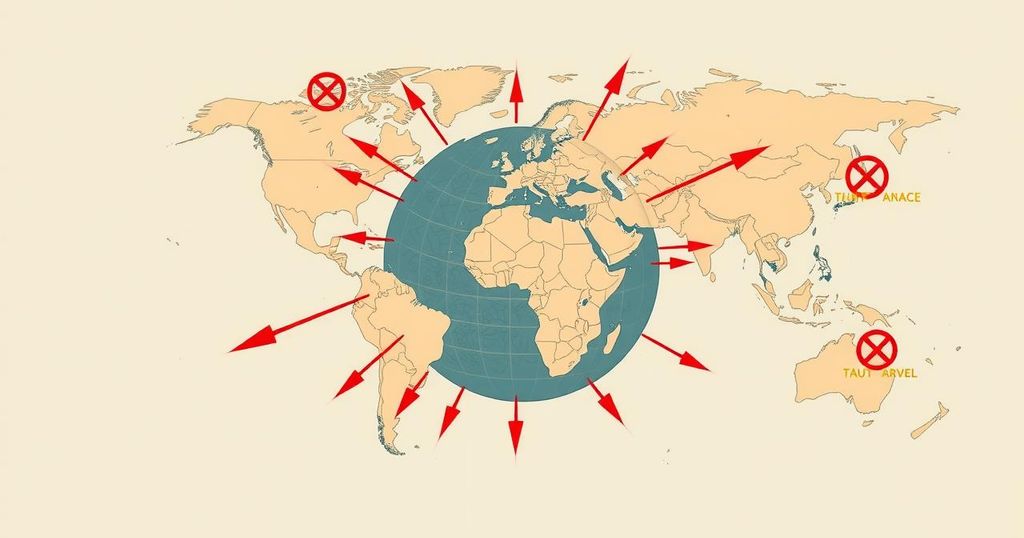The Trump administration is reviewing a proposal for expanded travel bans affecting citizens from 43 countries, categorized into Red, Orange, and Yellow lists. The Red List enforces a total ban, the Orange List imposes visa restrictions, and the Yellow List allows 60 days for countries to address security concerns. The proposal has sparked debates over its implications and legality.
The Trump administration is considering a significant extension of travel restrictions that may impact citizens from up to 43 countries. According to internal reviews reported by the New York Times, the proposed plan is more extensive than previous travel bans implemented during President Trump’s initial term.
The proposal divides countries into three categories of restrictions: Red, Orange, and Yellow. The final list will undergo adjustments following thorough diplomatic and security assessments.
The Red List includes 11 countries from which all citizens would be prohibited from entering the United States, namely Afghanistan, Bhutan, Cuba, Iran, Libya, North Korea, Somalia, Sudan, Syria, Venezuela, and Yemen.
The Orange List comprises 10 countries wherein citizen travel would be highly restricted. Individuals from these nations, which include Belarus, Eritrea, Haiti, Laos, Myanmar, Pakistan, Russia, Sierra Leone, South Sudan, and Turkmenistan, may qualify for certain visas but would undergo mandatory in-person interviews.
Countries on the Yellow List, totaling 22, are granted a period of 60 days to address security and information-sharing concerns to avoid categorization in a stricter level. The Yellow List includes Angola, Antigua and Barbuda, Benin, Burkina Faso, Cambodia, Cameroon, Cape Verde, Chad, Republic of Congo, Democratic Republic of Congo, Dominica, Equatorial Guinea, Gambia, Liberia, Malawi, Mali, Mauritania, St. Kitts and Nevis, St. Lucia, São Tomé and Príncipe, Vanuatu, and Zimbabwe.
State Department officials, together with security experts and intelligence agencies, are meticulously analyzing this preliminary draft list. Their focus is on verifying the cited deficiencies and weighing the diplomatic repercussions related to the inclusion of certain nations. The proposal may undergo modifications to align with international collaboration priorities.
A key consideration remains whether the suggested travel ban would also target individuals holding existing visas or green cards, alongside concerns about its potential ramifications on diplomatic ties, particularly with nations like Russia and Venezuela.
The proposal rekindles discussions surrounding the ethical implications and legality of travel bans. During his previous term, initial versions were challenged in courts, although the Supreme Court later affirmed a revised version affecting eight nations. While President Biden rescinded Trump’s earlier bans, labeling them a “stain on our national conscience,” the new order justifies travel restrictions based on national security grounds, albeit with the inclusion of countries not previously affected.
In summary, the Trump administration’s proposal for expanded travel bans delineates countries into three categories based on security assessments. Noteworthy is the inclusion of nations like Bhutan and Russia, which raises concerns regarding international diplomatic relations. As the proposal undergoes review, critical questions regarding the impact on existing visa holders and potential legal challenges remain unresolved.
Original Source: www.financialexpress.com






